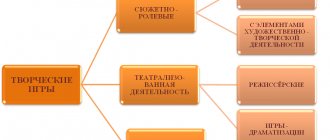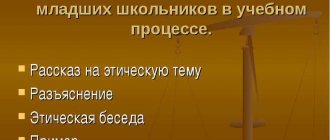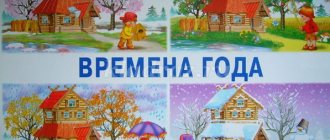Age characteristics of junior schoolchildren
In the process of pedagogical work aimed at the moral education of younger schoolchildren, it is first of all necessary to take into account the age characteristics of children.
Age characteristics of younger schoolchildren include:
- Tendency to gaming activities. Despite the fact that at this age the leading activity is educational, children still show interest in games. In a playful form, it is easier for younger schoolchildren to understand educational material, it is easier for them to learn the rules of behavior in society, etc. In the process of working with children, it is effective to use game elements (physical education minutes, counting rhymes, etc.)
- Switching attention. Children of primary school age cannot engage in monotonous activities for a long time; it is difficult for them to maintain attention on one subject. Therefore, when working with children of primary school age, it is necessary to frequently change the type of activity. Classes should be interesting and entertaining. Here there is a connection with the first point, in order to attract the attention of children and make the learning process easier, it is possible to use game techniques.
- There is not enough clarity in the connection between past experience and moral ideas.
- Discrepancy between the norms of behavior and the personal desires of the child. The contradiction between knowledge “how to do it” and real actions. Quite often, children know how to behave, what to do in a given situation, but at the same time they act and do things differently, against the rules.
- Uneven standards of communication (with peers, adults, at home, at school, etc.).
Are you an expert in this subject area? We invite you to become the author of the Directory Working Conditions
Basic theories of moral development in the family
1. Jean Piaget's theory of moral development
According to the Swiss psychologist J. Piaget, who purposefully studied the characteristics of child development, there are two periods of moral development of children in the family.
- The first period lasts from birth to seven years. It's called heteronomy. Characterized by the imposition of moral principles on a child.
- The second period is after seven years, called autonomy.
J. Piaget believed that cognitive abilities influence the development of morality in a child. Therefore, in his works he presented a list of age stages, each of which is characterized by the formation of morality. Let's look at the stages in detail.
Sensorimotor stage (up to 2 years):
- the development of motor skills is the ability through which understanding of the world around us occurs;
- the child learns about the world through physical interaction: observes objects, takes them in his hands, examines them closely;
- the baby has an awareness of the “permanence of objects,” in other words, that objects exist even in those moments when he does not visually see, hear, or touch them.
Purpose, objectives and essence of moral education
The main goal of moral education is the formation of the transition of moral norms into personal life beliefs, the harmonious development of the individual, the development of spiritual and material potential.
Note 2
The final result of the moral education of a child of primary school age is the formation of his moral culture.
In a broad sense, the goals of moral education are as follows:
- formation of moral values in a child;
- maintaining the unity of practical and educational tasks;
- formation of the foundations of morality and ethics;
- formation of humanism;
- expanding the child’s moral horizons;
- formation of the need for self-improvement.
The content of moral education consists of the following categories:
- Attitude to the Motherland (formation of such qualities as patriotism, tolerance, civic position, etc.).
- Attitude towards others (qualities: collectivism, humanity, culture of communication, etc.).
- Attitude towards oneself (formation of personal qualities);
- Attitude to work (qualities: hard work, discipline, responsibility)
- Attitude to nature and cultural heritage (qualities: ecological culture, caring, frugality).
Finished works on a similar topic
Course work Pedagogical conditions for the moral education of junior schoolchildren 490 ₽ Abstract Pedagogical conditions for the moral education of junior schoolchildren 230 ₽ Test paper Pedagogical conditions for the moral education of junior schoolchildren 200 ₽
Receive completed work or specialist advice on your educational project Find out the cost
In general, moral education is multifaceted and includes many categories and personality traits that cover all spheres of human life and society.
The set goal of moral education of children of primary school age is achieved by solving the following tasks:
- development of the child’s moral consciousness (formation of motives and goals of behavior);
- development of moral qualities of the individual (formation of norms and skills of moral behavior);
- formation of a standard of behavior.
A separate task is the formation of strong-willed qualities: dedication, courage, determination, perseverance, the will to win.
The main rules of moral development in the family
The correct moral development of children in the family must go through three stages. Only in this way will a small person grow into a strong personality, immune to negative influences from the outside.
- The first level is motivation. It is important to create conditions so that the child wants to develop, strives to learn the norms and rules of morality.
- The second level is emotional-sensual. This is the correct education of emotions and sensations. Emotions are associated with feelings such as pity, compassion, empathy, and responsiveness. Here we cannot do without the personal example of adults. Moral teaching may not be enough. You can cultivate feelings only through support, and not through punishment.
- The third stage is rational. A growing person already has certain knowledge regarding norms of behavior and moral principles; he learns to distinguish between immoral and moral behavior.
The role of an adult’s assessment in the formation of a child’s moral attitudes
The guiding role in the moral education of a child will be played by the assessment of his behavior and activities by an adult, especially a parent. It is on the basis of approval or censure that the child’s idea of what can be done and what is undesirable will be formed. Praise from adults strengthens children's confidence that the action is positive. This makes him want to do the same in the future. Punishment, on the contrary, causes him a feeling of dissatisfaction and discomfort.
In the future, the assessment of the child’s adult behavior will form the basis for the self-assessment of his actions, which will allow him to adhere to the learned moral standards even in cases where adults are not around.
Ways to develop children
Primary social adaptation and its features
As we have already established, early childhood is the age when the basic moral qualities of children begin to form. A unique starting point in the process of moral education is the first moral demands presented to him by his immediate environment and society as a whole. The leading role in the development of a child’s morality is still played by an adult, whose behavior becomes a model for further actions for the child.
Stages of socialization of young children
Thanks to all this, the child is included in a phenomenon called primary adaptation in society. In order for primary social adaptation and its foundations to be as effective as possible, the child must develop a need for communication and interaction with parents. Based on this, in the future he will develop a friendly attitude towards his peers and close people in general. The child begins to “read” verbal and non-verbal signals from them, understand them, and later react and respond to them. In his life, permissions and prohibitions appear and play an increasingly significant role.
The mechanism of understanding what is possible and what is not possible in the future will form the basis for the formation of correct behavior and useful habits.
Children's preschool group
A children's group is the second model of society after the family, in which a child learns to interact with other children and adults. Here moral rules are tested and sharpened. A child finds himself in a large number of situations and initially needs the constant presence of an adult.
No moral arguments will help if the baby is not supported, comforted and heard. Children need to be given the opportunity to complain and cry, and only after that make a moral analysis of their behavior.
What is spiritual education?
The fact that the pursuit of ideals and the presence of meaning in life helps to survive in extreme conditions has been proven repeatedly. In particular, the creator of logotherapy (psychology of meaning) Viktor Frankl based on his personal experience in the concentration camps of the Third Reich.
His book about the experiences of prisoners, “Saying Yes to Life!”: A Psychologist in a Concentration Camp, explains why some despair and stop fighting for life (even with good physical characteristics), while others stubbornly survive. The area of emotional experiences and spiritual aspirations is more subtle than the reactions of the nervous system - more sensitive and important.
Spirituality is the most difficult aspect of pedagogy, because there is no common understanding of what “spirituality” is. But in any case, the invisible soul has visible manifestations. In three words, spiritual education is the assimilation of higher values.
There is a whole list of spiritual and moral values in the Strategy for the Development of Education in the Russian Federation for the period until 2025: this is philanthropy; justice; honor; conscience; will; personal dignity; faith in goodness; the desire to fulfill a moral duty to oneself, one’s family and one’s Fatherland.
The difficulty lies in the interpretation of these values. Thus, “love” can explain both connivance and tyranny. There are secular and religious understandings of spiritual values - two mutually exclusive concepts:
| 1 | “man is the measure of all things” (a pre-Christian concept, it also became popular in the Renaissance and again now, where the ideal is relative and subjective, and values and ideas about good and evil can change over time); |
| 2 | “God is the measure of all things” (a Christian concept where the absolute ideal is a sinless Man, and values are eternal). |
With all the diversity of spiritual qualities, the main enemy of spiritual formation and growth is hypocrisy. This applies to both believers and non-believers educators. There is always a danger of confusing ends with means, which is well illustrated by the intolerance and hatred of people that is found among overtly religious people and environmentalists.
And the main indicator of spiritual state is the attitude towards people. As the Bible says: “Whoever says, ‘I love God,’ and hates his brother, is a liar: for he who does not love his brother whom he has seen, how can he love God whom he has not seen?” In other words, spirituality is inseparable from morality.
Family as the basis
The importance of the family is also so great because the child receives his first experience in it, which he strives to realize in later life. The behavior of the father and mother is the first role model for the child. The child unconsciously begins to adopt intonation, manner of speaking, sentence structure, gait, and even speech defects. The baby also begins to carefully observe how the parents’ relationships develop with other people and the environment. Caring for loved ones, respecting other people's interests, the ability to control one's feelings and behavior - everything comes from the family.




